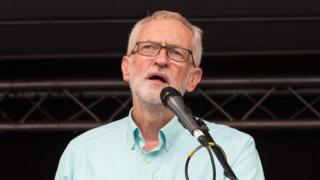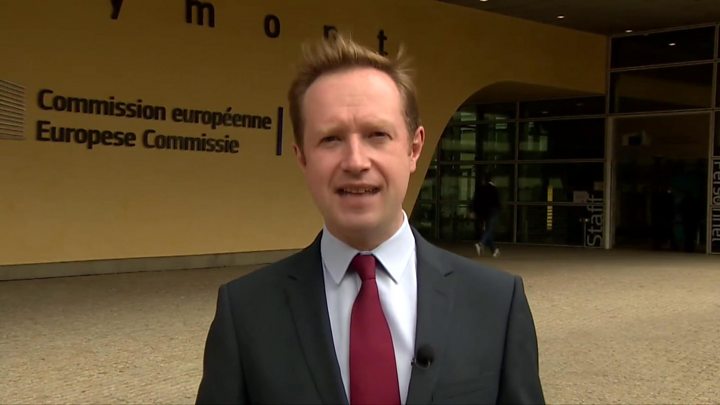Brexit: Corbyn seeks clarity on ‘unconstitutional’ election-time no-deal
 Image copyright Barcroft Media
Image copyright Barcroft Media Jeremy Corbyn has asked the cabinet secretary to rule on whether Boris Johnson could force through a no-deal Brexit in a general election period.
There have been reports the PM could call an election that would be held after the 31 October Brexit deadline – the day the UK is due to leave the EU.
The Labour leader has written to Sir Mark Sedwill saying such a move would be an “anti-democratic abuse of power”.
It comes amid speculation MPs will table a no-confidence motion in the PM.
It is thought opposition MPs could propose the vote in a bid to prevent the UK leaving the EU with no deal.
The UK will leave the EU on 31 October with or without a deal unless Article 50 is extended or revoked.
Mr Corbyn said the party would propose the vote at an “appropriate” time after the Commons returns from its summer recess on 5 September.
What happens if the PM loses?
If the PM loses the motion of no-confidence, then under the Fixed Term Parliaments Act he would have another 14 days to win another vote.
If he fails to secure the vote then a general election would be called on a date advised on by the PM.
However, if another candidate can secure the confidence of the Commons then, under cabinet rules, Mr Johnson would be expected to resign and recommend the Queen appoints the other person.
The ex-leader of the Liberal Democrats predicted his party and a “significant number” of Tories would support a no-confidence motion.
Sir Vince Cable told BBC’s Newsnight the UK has been in a constitutional crisis for “a long time” and there would be wide support for an “emergency administration” to take over from Mr Johnson.
What does the government say?
According to the Sunday Telegraph, Dominic Cummings, the PM’s senior adviser at No 10, told MPs that, even if Mr Johnson lost a no-confidence vote, it would not prevent him taking the UK out of the EU by the agreed deadline.
He is reported to have said the PM could call an election to fall after 31 October, by which time Britain would be out of the EU.
Brexiteers say Britain’s departure from the EU is already set, with Parliament having voted to leave, to trigger Article 50 and to pass legislation to set a deadline of 31 October.

Media playback is unsupported on your device
An ‘unprecedented’ move
In his letter to Sir Mark, Mr Corbyn called such a move “unprecedented” and “unconstitutional”.
He referred to the Cabinet Office’s election “purdah” guidance, which states that policy decisions on which a new government “might be expected to want to take a different view” should be postponed until after the election.
Mr Corbyn added that a Labour government would never support a no-deal Brexit, and so would “want the opportunity to take a different view”.
He called on Sir Mark to rule that if the UK was due to leave the EU with no deal during an election, the government should seek another time-limited extension to Article 50 to give voters the choice.
“Forcing through no-deal against a decision of Parliament, and denying the choice to the voters in a general election already under way, would be an unprecedented, unconstitutional and anti-democratic abuse of power by a prime minister elected not by the public but by a small number of unrepresentative Conservative Party members,” he wrote.
Analysis
By Peter Saull, political correspondent
In the period before elections there are restrictions on what civil servants can and can’t do.
The idea is to stop what is, effectively, a caretaker government from implementing decisions that the next government might disagree with.
Downing Street would probably argue that those rules don’t apply to Brexit.
The UK’s withdrawal from the EU has been the legal default since MPs voted to trigger Article 50 in March 2017.
Nevertheless, purdah rules could limit the government’s ability to make last-minute preparations for a no deal departure.
Ministers would not, for example, be able to instruct civil servants to start a new public information campaign.
Of course, all of this is unchartered territory and no-one knows for sure quite how it will all pan out.




